Module1 Lost and found 复习课件2021-2022学年外研版七年级英语下册(55张PPT)
文档属性
| 名称 | Module1 Lost and found 复习课件2021-2022学年外研版七年级英语下册(55张PPT) |

|
|
| 格式 | pptx | ||
| 文件大小 | 21.8MB | ||
| 资源类型 | 教案 | ||
| 版本资源 | 外研版 | ||
| 科目 | 英语 | ||
| 更新时间 | 2022-04-19 14:08:41 | ||
图片预览

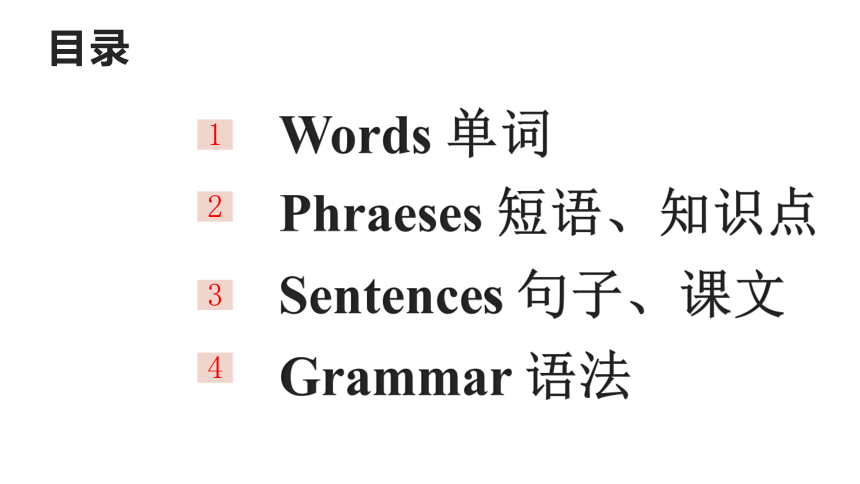
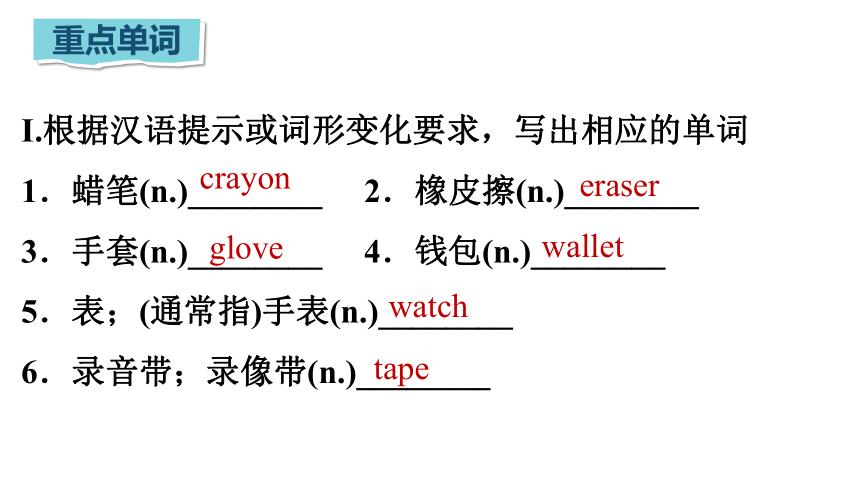
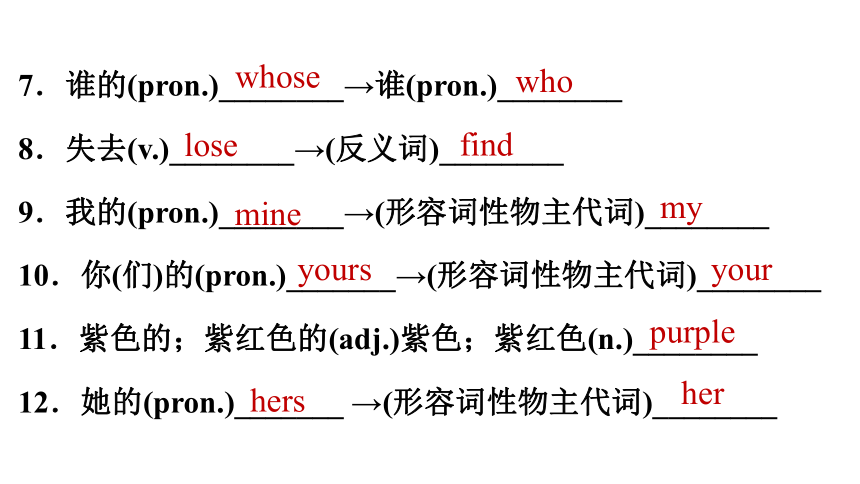
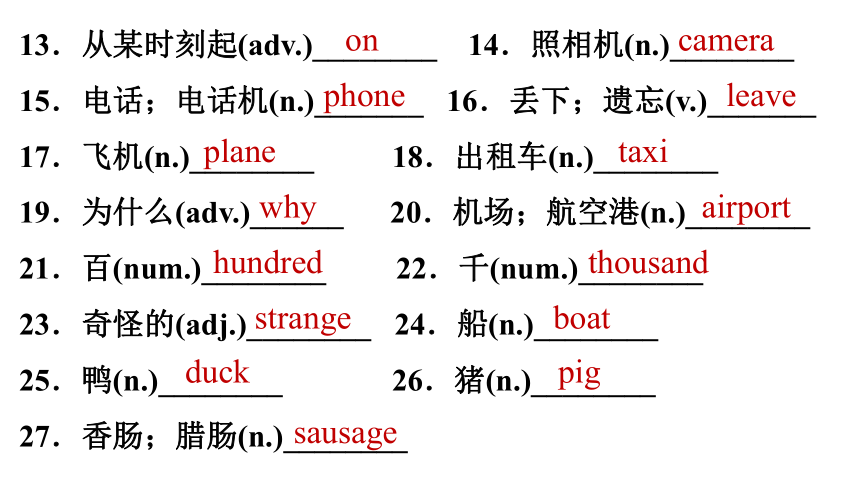
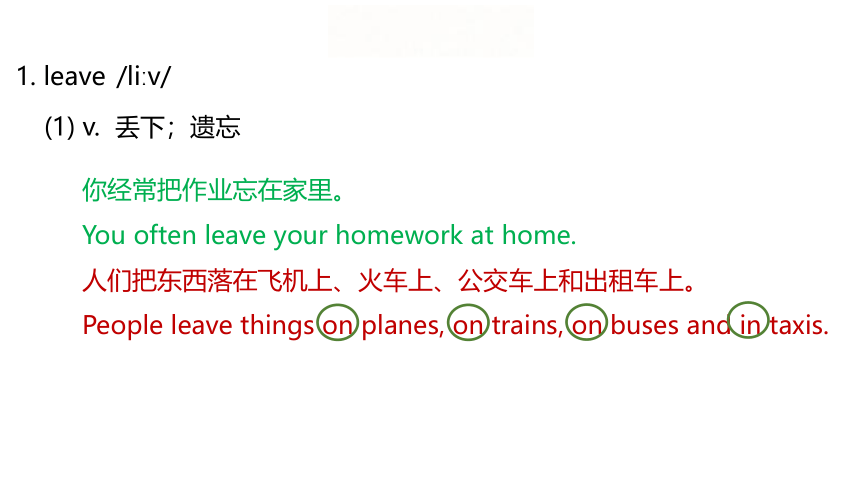
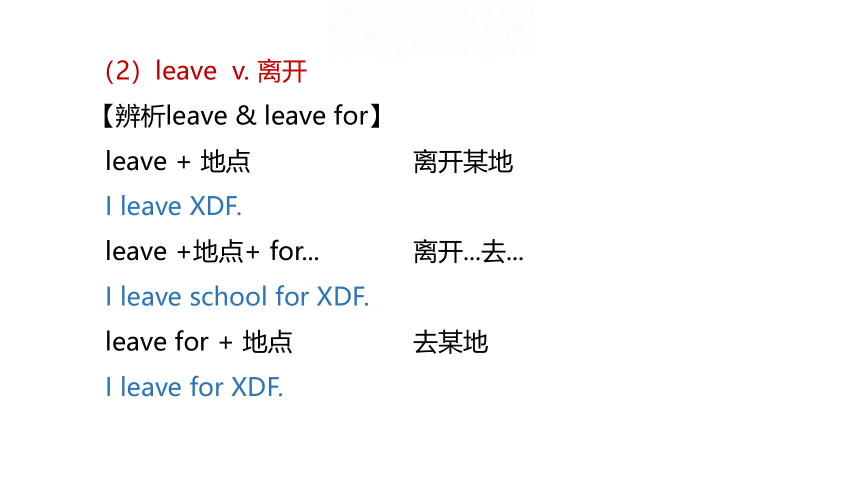
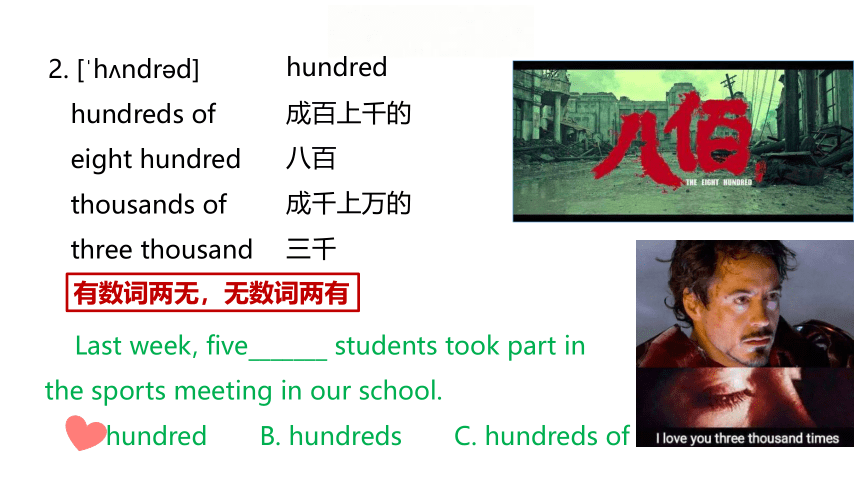
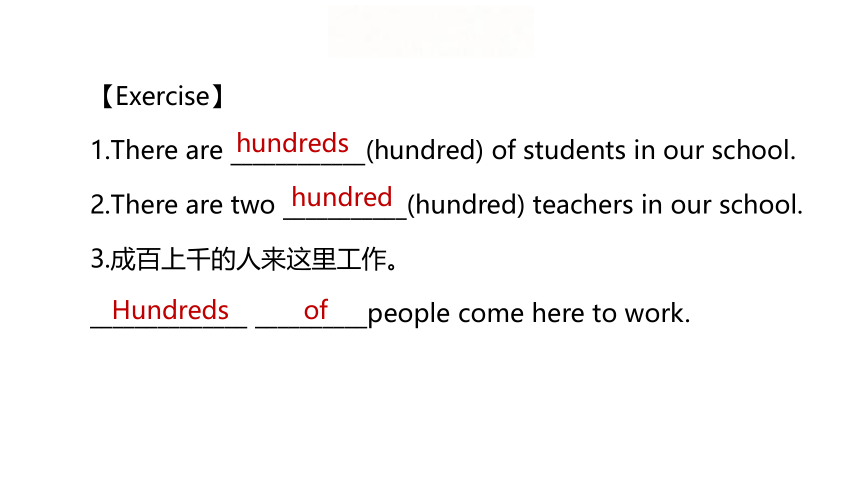
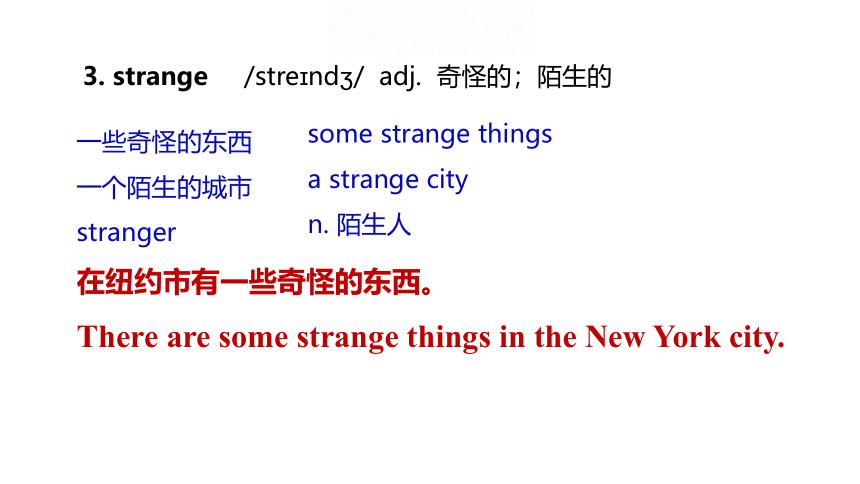
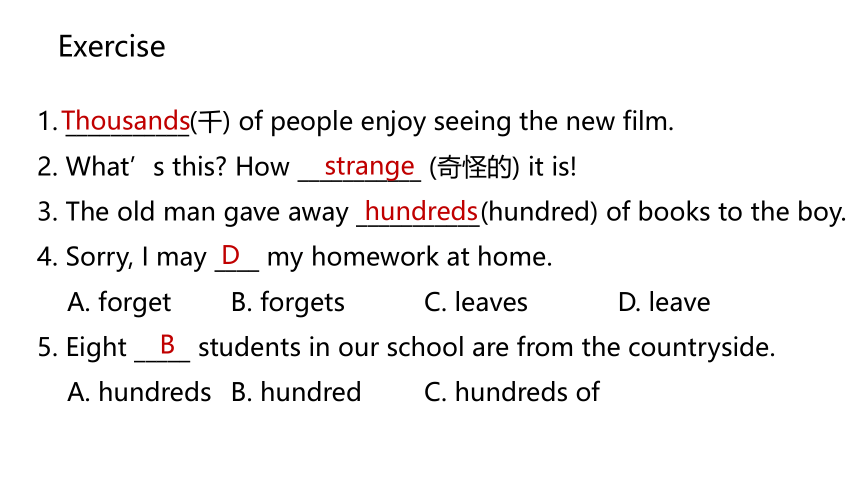
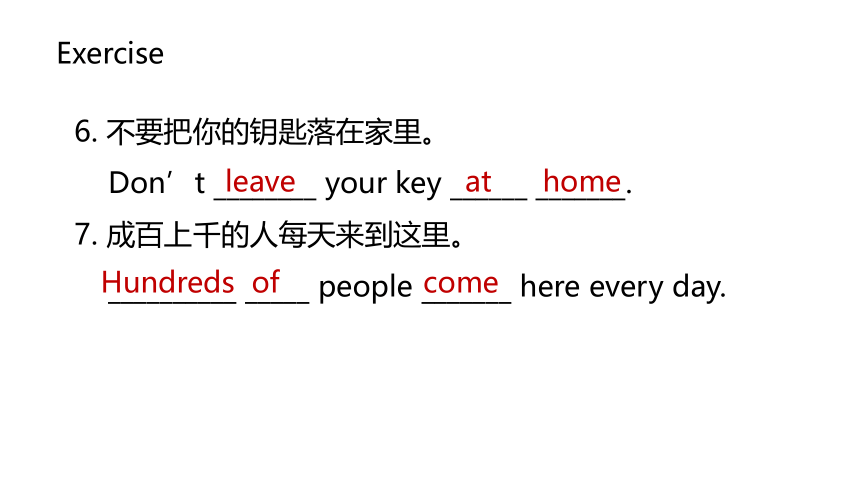
文档简介
(共55张PPT)
Revision for Module 1
Lost and Found
目录
1
3
2
Grammar 语法
Sentences 句子、课文
Words 单词
Phraeses 短语、知识点
4
Ⅰ.根据汉语提示或词形变化要求,写出相应的单词
1.蜡笔(n.)________ 2.橡皮擦(n.)________
3.手套(n.)________ 4.钱包(n.)________
5.表;(通常指)手表(n.)________
6.录音带;录像带(n.)________
重点单词
crayon
eraser
glove
wallet
watch
tape
7.谁的(pron.)________→谁(pron.)________
8.失去(v.)________→(反义词)________
9.我的(pron.)________→(形容词性物主代词)________
10.你(们)的(pron.)_______→(形容词性物主代词)________
11.紫色的;紫红色的(adj.)紫色;紫红色(n.)________
12.她的(pron.)_______ →(形容词性物主代词)________
whose
who
lose
find
mine
my
yours
your
purple
hers
her
13.从某时刻起(adv.)________ 14.照相机(n.)________
15.电话;电话机(n.)_______ 16.丢下;遗忘(v.)_______
17.飞机(n.)________ 18.出租车(n.)________
19.为什么(adv.)______ 20.机场;航空港(n.)________
21.百(num.)________ 22.千(num.)________
23.奇怪的(adj.)________ 24.船(n.)________
25.鸭(n.)________ 26.猪(n.)________
27.香肠;腊肠(n.)________
on
camera
phone
leave
plane
taxi
why
airport
hundred
thousand
strange
boat
duck
pig
sausage
1. leave
/li v/
(1) v. 丢下;遗忘
你经常把作业忘在家里。
You often leave your homework at home.
人们把东西落在飞机上、火车上、公交车上和出租车上。
People leave things on planes, on trains, on buses and in taxis.
(2)leave v. 离开
【辨析leave & leave for】
leave + 地点 离开某地
I leave XDF.
leave +地点+ for... 离开...去...
I leave school for XDF.
leave for + 地点 去某地
I leave for XDF.
2. [ h ndr d]
hundreds of
eight hundred
thousands of
three thousand
hundred
成百上千的
八百
成千上万的
三千
Last week, five_______ students took part in the sports meeting in our school.
A. hundred B. hundreds C. hundreds of
有数词两无,无数词两有
【Exercise】
1.There are ____________(hundred) of students in our school.
2.There are two ___________(hundred) teachers in our school.
3.成百上千的人来这里工作。
______________ __________people come here to work.
hundreds
hundred
Hundreds of
3. strange
/stre nd / adj. 奇怪的;陌生的
一些奇怪的东西
一个陌生的城市
stranger
在纽约市有一些奇怪的东西。
There are some strange things in the New York city.
some strange things
a strange city
n. 陌生人
Exercise
1. ___________(千) of people enjoy seeing the new film.
2. What’s this How ___________ (奇怪的) it is!
3. The old man gave away ___________(hundred) of books to the boy.
4. Sorry, I may ____ my homework at home.
A. forget B. forgets C. leaves D. leave
5. Eight _____ students in our school are from the countryside.
A. hundreds B. hundred C. hundreds of
Thousands
strange
hundreds
D
B
Exercise
6. 不要把你的钥匙落在家里。
Don’t ________ your key ______ _______.
7. 成百上千的人每天来到这里。
__________ _____ people _______ here every day.
leave at home
Hundreds of come
Ⅱ.根据汉语意思,写出相应的英文短语
28.首先;第一 ______________
29.失物招领箱 ______________
30.小心(对待)…… ______________
31.从现在开始 ______________
32.移动电话;手机 ______________
33.失物招领处 ______________
重点短语
first of all
lost and found box
be careful with
from now on
mobile phone
lost and found office
34.匆匆忙忙 ______________
35.几百;成百上千 ______________
36.寻找 ______________
37.上(车、船等) ______________
38.往里看 ______________
in a hurry
hundreds of
look for
get on
look in
39.和某人谈话 ______________
40.此刻;现在 ______________
41.拨打……找某人 ______________
42.在机场 ______________
talk to sb.
at the moment
call sb. at…
at airports
其他词组
1. Welcome to...
2. in taxis
3. many other things
4. at the moment
5. get on/off
欢迎来到…
在出租车上
很多其他的东西
现在
上/下 (车/飞机/船)
1. help 既可作动词,也可作名词。(中考考点)
作动词时: help sb (to) do sth=help sb with sth 帮助某人做某事 Help oneself to sth 随便吃某物
作名词时,with the help of 在….的帮助下 can’t help doing sth 禁不住做某事
help
2、辨析: look, look at, see, watch
1、look为不及物动词,后面不能带宾语,常单独使用,以引起对方注意。例如:Look! That's an English car. 看!那是一辆英国的小汽车。2、look at是由动词look 与介词at组成的词组,相当于及物动词,后面可以带宾语,侧重"看"的动作。例如:Look at the blackboard, please.请看黑板。3、see为及物动词,意思是"看见",侧重"看"的结果。例如:Can I see your new pen 我可以看看你的新钢笔吗?4、watch 是及物动词,意思是"观看、注视", 用来指注视移动着的物体,如看电视、看球赛、看戏等。例如:They are watching TV.他们正在看电视。
3、★辨析talk speak tell 与 say
speak 讲语言 speak to sb about sth tell 告诉讲述,动词常跟双宾语 tell sb sth/ tell sth to sb say 说 say sth to sb talk 交谈,聊天 talk to sb/ talk with sb about sth
着重说话的内容
说的动作/语言作宾语/较为正式的场合了表演讲或演说
强调两者之间的相互说话
4. think of 想起想出 think about 考 虑 think over 仔细思量
5.choose from 从…..中挑选 choose to do sth 决定,宁愿做某事
6.① try to do sth 尽量做某事,尽力做某事 ② try not to do sth 尽量不做某事,尽力不做某事 ③ try one’s best to do sth 进某人最大努力去做某事 ④ try doing sth 尝试做某事 ⑤ try on试穿试戴 ⑥ have a try 试一试
7. ask sb to do sth 让某人去做某事 ask sb not to do sth 要求某人不要去做某事
8、①look for “寻找”,含义为有意识地找,强调“寻找”的过程。区别 find,“找到”,强调“结果”。
Look at 看 Look forward to 期待 Look around 向四周看
Look after 照顾 Look up 查找; 向上看 Look over 检查
Look out 小心;向外看 Look through 浏览 Look like 看起来像
8. look forward to 盼望
to为介词,后面接动词时应该用动词-ing形式。
【拓展】look 短语
look after 照看,照顾
look at 朝……看,思考,考虑,研究
look for 寻找
look up 向上看,仰望,查找,检查
look
短语
Sentence-Unit1句子
1. People often lose things when they’re travelling or when they’re in a hurry.
(1) when
在家的时候我经常帮助我妈妈做家务。
I often help my mother do the housework ______________________
(2) in a hurry
hurry n. 匆忙,急忙
v. 匆忙,赶快
匆匆忙忙
+句子,表时间
when I’m at home.
连词,当…时候
Why are you in a hurry
【hurry】 v. 匆忙,赶快
hurry to do sth.
=do sth. in a hurry
他匆忙去火车站。
He hurries to go to the train station.
= He goes to the train station in a hurry.
hurry up
快点!出租车在等了!
Hurry up!The taxi is waiting!
匆忙去做某事
赶快
(1) That’s why...
那就是他们高兴的原因。
That’s why they are happy.
(2) at airports and stations
【潍坊中考】
You have spent too much time playing computer games. That’s _____
your eyes hurt.
A. why B. how C. what D. when
那就是…的原因;那就是为什么…
+结果
在机场和车站
A
2. That’s why there are lost and found offices at airports and stations.
(1) kilo
一千克
两千克苹果
(2) sausage
【练习】
1. How about eating ____________(香肠) this morning
2. 他想买三千克香肠。
He wants to buy three kilos of sausages.
[ ki l ] n. 千克
a kilo of
two kilos of apples
[ s s d ] n. 香肠
sausages
3. Are you looking for fifteen kilos of sausages
Exercise
1. The bus is coming. Oh! It’s full. I’m afraid we can‘t ______ it.
A. get up B. get on C. get off D. get into
2. The tiger eats ______ meat every day.
A. six kilos of B. six kilo of C. six kilos
3. 那就是他总迟到的原因。
________ ________ he is always late.
4. 此时很多人正在睡觉。
______ ______ _________, many people are sleeping.
B
A
That’s why
At the moment
Exercise
5. 每天早晨那些人总是匆匆忙忙地去上班。
Every morning those people always _____ ____ _______ ____ ____ _______.
=Every morning those people always _______ ______ _____ ______ _______.
6. 他们正在找很多其他的东西。
They are ___________ _______ _________ _________ __________.
7. 欢迎来到纽约失物招领处。
____________ ______ the New York City _______ _______ _________ _________.
go to work in a hurry
hurry to go to work
looking for many other things
Welcome to Lost and Found Office
纽约市失物招领处很大。
the lost and found office
Lost and Found
The New York City Lost and Found Office is very big.
每天都有几百人到这里来。
Hundreds of people come here every day.
hundreds of people
他们来寻找他们的电话、照相机、手表、电脑和许多其他的东西。
look for
many other things
They are looking for their phones, cameras, watches, computers and
many other things.
我们通常有大约两千部手机和一千部照相机。
usually
two thousand
We usually have about two thousand mobile phones and one thousand cameras.
连句成篇
纽约市失物招领处很大。
The New York City Lost and Found Office is very big.
每天都有几百人到这里来。
Hundreds of people come here every day.
他们来寻找他们的电话、照相机、手表、电脑和许多其他的东西。
They are looking for their phones, cameras, watches, computers and
many other things.
我们通常有大约两千部手机和一千部照相机。
We usually have about two thousand mobile phones and one
thousand cameras.
课文改写
The New York City Lost and Found Office is very big. Every day, 1. of people come here to look for their phones, cameras, watches, computers and many other things. People often lose these things when they're travelling or when they're in a 2. .
阅读Unit 2的课文,根据课文内容在横线上填入所缺的单词,每空一词。
hundreds
hurry
At the moment, there are also some 3. things here. There are about a hundred bikes and a large 4. . This week, there are some animals here: three dogs, two 5._______ and a 6. ! 7. are they Oh, there are fifteen kilos of 8. here too!
strange
boat
ducks
pig
Whose
sausages
人称代词和物主代词
[探究 物主代词]
1. 含义:
物主代词是表示所有关系的代词,它分为________ 物主代词和________物主代词两种,其人称和数的变化详见下表:
形容词性
名词性
完成下列表格。
第一人称 第二人称 第三人称
单数 复数 单数 复数 单数 复 数
人称代词 主格 we you he/she/it
宾格 me you them
物主代词 形容词性
名词性
I
they
us
you
you
him/her/it
my
our
your
your
his/her/its
their
mine
ours
yours
yours
his/hers/its
theirs
二、分类
作主语
主格
位于句首
作宾语
宾格
位于介词/动词之后
形容词性物主代词
相当于形容词,后跟名词
名词性物主代词
相当于名词,后不跟名词
代词
人称代词
物主代词
形容词性物主代词
名词性物主代词
主格:作主语,后面直接加谓语动词,放在句子开头。
宾格:作宾语,放在动词或介词后面。
形容词性物主代词作 ,用在 前。
名词性物主代词相当于 ,在句中可用作主语、宾语和表语,为了避免重复常用
代替 + 名词的形式。
定语
名词
名词
名词性物主代词
形容词性物主代词
有名则形 无名则名
解题大招
三.用法:
(1)形容词性物主代词相当于形容词,在句中作定语,修饰名词,一般不单独使用。如:
This is my pen.这是我的钢笔。
That is her pen.那是她的钢笔。
(2)名词性物主代词相当于名词。为了避免和前面提及的名词重复,可单独使用,相当于“形容词性物主代词+名词”。如:
These are my books.=These books are mine. 这些书是我的。
(3)名词性物主代词可用在of 后面,相当于“of+名词所有格”。如:
Here's a wallet of mine.
这是我的钱包。
This term we have two new teachers.One of them is a friend of my father's.
这个学期我们有两位新老师,其中一位是我爸爸的朋友。
Reading
已掌握 请打√ 单词 音标 在本文中的词性 在本文中的释义
□ clear /kl /
□ however /ha ev /
□ leave /li v/
□ meet /mi t/
□ offer / f /
□ pay /pe /
□ poor /p /
□ ride /ra d/
□ rudely /'ru dli/
□ traveler / tr v l /
adj.
显然的
adv.
然而
v.
留下
v.
满足
v.
提供
v.
支付
adj.
可怜的
n.
搭乘;短途旅程
adv.
粗鲁地
n.
旅客
已掌握 请打√ 短语 在本文中的释义 例句
□ leave behind He left for Washington, leaving the children behind with their mother.
【参考译文】
□ pay for I’ll pay for the train tickets.
【参考译文】
□ thank sb. for sth. He thanked me several times for coming.
【参考译文】
留下
为……支付
因某事感谢某人
It was a rainy night in New Orleans, US. At a bus station, I watched a young girl (1) ________ and her bag was open on the ground. It was clear that she lost her (2) ________. She asked the bus driver not to leave her behind.
“Losing your ticket is like losing money,” the bus driver said (3) ________, and left her in the rain. But then an old man stood up and stopped the driver’s way. “How can you (4) ________ that poor girl out there You know she had a ticket. You can’t leave her in a city where she doesn’t have a friend. You will meet your planned time but she might meet her end.”
1. A. cry B. run C. dance D. sing
2. A. novel B. ticket C. watch D. notes
3. A. politely B. rudely C. carefully D. friendly
4. A. feed B. book C. follow D. leave
However, the driver didn’t hear or think about the young girl’s problem, or (5) ________ her travels became. So the old gentleman said, “I will (6) ________ her bus ride. And I will give her a little money to help her on the way”. He went and (7) ________ a ticket for the girl.
5. A. how B. why C. when D. where
6. A. look after B. warm up C. take away D. pay for
7. A. threw B. hid C. bought D. missed
“How can I thank you for your kind (8) ________ offered to me today ” she asked. “We won’t meet again because we are just (9) ________.” The old man said, “What goes around comes around. I learned this with time. What you give, you always get back. Always be (10) ________ to others and give them what you can give.
8. A. words B. help C. smile D. joke
9. A. classmates B. travelers C. friends D. players
10. A. nice B. serious C. strict D. brave
同学
旅客
玩伴
友好的
严肃的
严格的
勇敢的
________ 1. 离开;遗留 A. clear
________ 2. 提供,给予 B. however
________ 3. 显然的,无疑的 C. leave
________ 4. 然而 D. leave behind
________ 5. 满足 E. offer
________ 6. 遗留,丢弃 F. meet
C
E
A
B
F
D
Exercise
_______ 1. 可怜的 A. pay
_______ 2. 粗鲁地 B. poor
_______ 3. 短途旅程 C. thank sb. for sth.
_______ 4. 旅行者 D. rudely
_______ 5. 支付 E. traveler
_______ 6. 为某事感谢某人 F. ride
B
D
F
E
A
C
Exercise
THANKS
Revision for Module 1
Lost and Found
目录
1
3
2
Grammar 语法
Sentences 句子、课文
Words 单词
Phraeses 短语、知识点
4
Ⅰ.根据汉语提示或词形变化要求,写出相应的单词
1.蜡笔(n.)________ 2.橡皮擦(n.)________
3.手套(n.)________ 4.钱包(n.)________
5.表;(通常指)手表(n.)________
6.录音带;录像带(n.)________
重点单词
crayon
eraser
glove
wallet
watch
tape
7.谁的(pron.)________→谁(pron.)________
8.失去(v.)________→(反义词)________
9.我的(pron.)________→(形容词性物主代词)________
10.你(们)的(pron.)_______→(形容词性物主代词)________
11.紫色的;紫红色的(adj.)紫色;紫红色(n.)________
12.她的(pron.)_______ →(形容词性物主代词)________
whose
who
lose
find
mine
my
yours
your
purple
hers
her
13.从某时刻起(adv.)________ 14.照相机(n.)________
15.电话;电话机(n.)_______ 16.丢下;遗忘(v.)_______
17.飞机(n.)________ 18.出租车(n.)________
19.为什么(adv.)______ 20.机场;航空港(n.)________
21.百(num.)________ 22.千(num.)________
23.奇怪的(adj.)________ 24.船(n.)________
25.鸭(n.)________ 26.猪(n.)________
27.香肠;腊肠(n.)________
on
camera
phone
leave
plane
taxi
why
airport
hundred
thousand
strange
boat
duck
pig
sausage
1. leave
/li v/
(1) v. 丢下;遗忘
你经常把作业忘在家里。
You often leave your homework at home.
人们把东西落在飞机上、火车上、公交车上和出租车上。
People leave things on planes, on trains, on buses and in taxis.
(2)leave v. 离开
【辨析leave & leave for】
leave + 地点 离开某地
I leave XDF.
leave +地点+ for... 离开...去...
I leave school for XDF.
leave for + 地点 去某地
I leave for XDF.
2. [ h ndr d]
hundreds of
eight hundred
thousands of
three thousand
hundred
成百上千的
八百
成千上万的
三千
Last week, five_______ students took part in the sports meeting in our school.
A. hundred B. hundreds C. hundreds of
有数词两无,无数词两有
【Exercise】
1.There are ____________(hundred) of students in our school.
2.There are two ___________(hundred) teachers in our school.
3.成百上千的人来这里工作。
______________ __________people come here to work.
hundreds
hundred
Hundreds of
3. strange
/stre nd / adj. 奇怪的;陌生的
一些奇怪的东西
一个陌生的城市
stranger
在纽约市有一些奇怪的东西。
There are some strange things in the New York city.
some strange things
a strange city
n. 陌生人
Exercise
1. ___________(千) of people enjoy seeing the new film.
2. What’s this How ___________ (奇怪的) it is!
3. The old man gave away ___________(hundred) of books to the boy.
4. Sorry, I may ____ my homework at home.
A. forget B. forgets C. leaves D. leave
5. Eight _____ students in our school are from the countryside.
A. hundreds B. hundred C. hundreds of
Thousands
strange
hundreds
D
B
Exercise
6. 不要把你的钥匙落在家里。
Don’t ________ your key ______ _______.
7. 成百上千的人每天来到这里。
__________ _____ people _______ here every day.
leave at home
Hundreds of come
Ⅱ.根据汉语意思,写出相应的英文短语
28.首先;第一 ______________
29.失物招领箱 ______________
30.小心(对待)…… ______________
31.从现在开始 ______________
32.移动电话;手机 ______________
33.失物招领处 ______________
重点短语
first of all
lost and found box
be careful with
from now on
mobile phone
lost and found office
34.匆匆忙忙 ______________
35.几百;成百上千 ______________
36.寻找 ______________
37.上(车、船等) ______________
38.往里看 ______________
in a hurry
hundreds of
look for
get on
look in
39.和某人谈话 ______________
40.此刻;现在 ______________
41.拨打……找某人 ______________
42.在机场 ______________
talk to sb.
at the moment
call sb. at…
at airports
其他词组
1. Welcome to...
2. in taxis
3. many other things
4. at the moment
5. get on/off
欢迎来到…
在出租车上
很多其他的东西
现在
上/下 (车/飞机/船)
1. help 既可作动词,也可作名词。(中考考点)
作动词时: help sb (to) do sth=help sb with sth 帮助某人做某事 Help oneself to sth 随便吃某物
作名词时,with the help of 在….的帮助下 can’t help doing sth 禁不住做某事
help
2、辨析: look, look at, see, watch
1、look为不及物动词,后面不能带宾语,常单独使用,以引起对方注意。例如:Look! That's an English car. 看!那是一辆英国的小汽车。2、look at是由动词look 与介词at组成的词组,相当于及物动词,后面可以带宾语,侧重"看"的动作。例如:Look at the blackboard, please.请看黑板。3、see为及物动词,意思是"看见",侧重"看"的结果。例如:Can I see your new pen 我可以看看你的新钢笔吗?4、watch 是及物动词,意思是"观看、注视", 用来指注视移动着的物体,如看电视、看球赛、看戏等。例如:They are watching TV.他们正在看电视。
3、★辨析talk speak tell 与 say
speak 讲语言 speak to sb about sth tell 告诉讲述,动词常跟双宾语 tell sb sth/ tell sth to sb say 说 say sth to sb talk 交谈,聊天 talk to sb/ talk with sb about sth
着重说话的内容
说的动作/语言作宾语/较为正式的场合了表演讲或演说
强调两者之间的相互说话
4. think of 想起想出 think about 考 虑 think over 仔细思量
5.choose from 从…..中挑选 choose to do sth 决定,宁愿做某事
6.① try to do sth 尽量做某事,尽力做某事 ② try not to do sth 尽量不做某事,尽力不做某事 ③ try one’s best to do sth 进某人最大努力去做某事 ④ try doing sth 尝试做某事 ⑤ try on试穿试戴 ⑥ have a try 试一试
7. ask sb to do sth 让某人去做某事 ask sb not to do sth 要求某人不要去做某事
8、①look for “寻找”,含义为有意识地找,强调“寻找”的过程。区别 find,“找到”,强调“结果”。
Look at 看 Look forward to 期待 Look around 向四周看
Look after 照顾 Look up 查找; 向上看 Look over 检查
Look out 小心;向外看 Look through 浏览 Look like 看起来像
8. look forward to 盼望
to为介词,后面接动词时应该用动词-ing形式。
【拓展】look 短语
look after 照看,照顾
look at 朝……看,思考,考虑,研究
look for 寻找
look up 向上看,仰望,查找,检查
look
短语
Sentence-Unit1句子
1. People often lose things when they’re travelling or when they’re in a hurry.
(1) when
在家的时候我经常帮助我妈妈做家务。
I often help my mother do the housework ______________________
(2) in a hurry
hurry n. 匆忙,急忙
v. 匆忙,赶快
匆匆忙忙
+句子,表时间
when I’m at home.
连词,当…时候
Why are you in a hurry
【hurry】 v. 匆忙,赶快
hurry to do sth.
=do sth. in a hurry
他匆忙去火车站。
He hurries to go to the train station.
= He goes to the train station in a hurry.
hurry up
快点!出租车在等了!
Hurry up!The taxi is waiting!
匆忙去做某事
赶快
(1) That’s why...
那就是他们高兴的原因。
That’s why they are happy.
(2) at airports and stations
【潍坊中考】
You have spent too much time playing computer games. That’s _____
your eyes hurt.
A. why B. how C. what D. when
那就是…的原因;那就是为什么…
+结果
在机场和车站
A
2. That’s why there are lost and found offices at airports and stations.
(1) kilo
一千克
两千克苹果
(2) sausage
【练习】
1. How about eating ____________(香肠) this morning
2. 他想买三千克香肠。
He wants to buy three kilos of sausages.
[ ki l ] n. 千克
a kilo of
two kilos of apples
[ s s d ] n. 香肠
sausages
3. Are you looking for fifteen kilos of sausages
Exercise
1. The bus is coming. Oh! It’s full. I’m afraid we can‘t ______ it.
A. get up B. get on C. get off D. get into
2. The tiger eats ______ meat every day.
A. six kilos of B. six kilo of C. six kilos
3. 那就是他总迟到的原因。
________ ________ he is always late.
4. 此时很多人正在睡觉。
______ ______ _________, many people are sleeping.
B
A
That’s why
At the moment
Exercise
5. 每天早晨那些人总是匆匆忙忙地去上班。
Every morning those people always _____ ____ _______ ____ ____ _______.
=Every morning those people always _______ ______ _____ ______ _______.
6. 他们正在找很多其他的东西。
They are ___________ _______ _________ _________ __________.
7. 欢迎来到纽约失物招领处。
____________ ______ the New York City _______ _______ _________ _________.
go to work in a hurry
hurry to go to work
looking for many other things
Welcome to Lost and Found Office
纽约市失物招领处很大。
the lost and found office
Lost and Found
The New York City Lost and Found Office is very big.
每天都有几百人到这里来。
Hundreds of people come here every day.
hundreds of people
他们来寻找他们的电话、照相机、手表、电脑和许多其他的东西。
look for
many other things
They are looking for their phones, cameras, watches, computers and
many other things.
我们通常有大约两千部手机和一千部照相机。
usually
two thousand
We usually have about two thousand mobile phones and one thousand cameras.
连句成篇
纽约市失物招领处很大。
The New York City Lost and Found Office is very big.
每天都有几百人到这里来。
Hundreds of people come here every day.
他们来寻找他们的电话、照相机、手表、电脑和许多其他的东西。
They are looking for their phones, cameras, watches, computers and
many other things.
我们通常有大约两千部手机和一千部照相机。
We usually have about two thousand mobile phones and one
thousand cameras.
课文改写
The New York City Lost and Found Office is very big. Every day, 1. of people come here to look for their phones, cameras, watches, computers and many other things. People often lose these things when they're travelling or when they're in a 2. .
阅读Unit 2的课文,根据课文内容在横线上填入所缺的单词,每空一词。
hundreds
hurry
At the moment, there are also some 3. things here. There are about a hundred bikes and a large 4. . This week, there are some animals here: three dogs, two 5._______ and a 6. ! 7. are they Oh, there are fifteen kilos of 8. here too!
strange
boat
ducks
pig
Whose
sausages
人称代词和物主代词
[探究 物主代词]
1. 含义:
物主代词是表示所有关系的代词,它分为________ 物主代词和________物主代词两种,其人称和数的变化详见下表:
形容词性
名词性
完成下列表格。
第一人称 第二人称 第三人称
单数 复数 单数 复数 单数 复 数
人称代词 主格 we you he/she/it
宾格 me you them
物主代词 形容词性
名词性
I
they
us
you
you
him/her/it
my
our
your
your
his/her/its
their
mine
ours
yours
yours
his/hers/its
theirs
二、分类
作主语
主格
位于句首
作宾语
宾格
位于介词/动词之后
形容词性物主代词
相当于形容词,后跟名词
名词性物主代词
相当于名词,后不跟名词
代词
人称代词
物主代词
形容词性物主代词
名词性物主代词
主格:作主语,后面直接加谓语动词,放在句子开头。
宾格:作宾语,放在动词或介词后面。
形容词性物主代词作 ,用在 前。
名词性物主代词相当于 ,在句中可用作主语、宾语和表语,为了避免重复常用
代替 + 名词的形式。
定语
名词
名词
名词性物主代词
形容词性物主代词
有名则形 无名则名
解题大招
三.用法:
(1)形容词性物主代词相当于形容词,在句中作定语,修饰名词,一般不单独使用。如:
This is my pen.这是我的钢笔。
That is her pen.那是她的钢笔。
(2)名词性物主代词相当于名词。为了避免和前面提及的名词重复,可单独使用,相当于“形容词性物主代词+名词”。如:
These are my books.=These books are mine. 这些书是我的。
(3)名词性物主代词可用在of 后面,相当于“of+名词所有格”。如:
Here's a wallet of mine.
这是我的钱包。
This term we have two new teachers.One of them is a friend of my father's.
这个学期我们有两位新老师,其中一位是我爸爸的朋友。
Reading
已掌握 请打√ 单词 音标 在本文中的词性 在本文中的释义
□ clear /kl /
□ however /ha ev /
□ leave /li v/
□ meet /mi t/
□ offer / f /
□ pay /pe /
□ poor /p /
□ ride /ra d/
□ rudely /'ru dli/
□ traveler / tr v l /
adj.
显然的
adv.
然而
v.
留下
v.
满足
v.
提供
v.
支付
adj.
可怜的
n.
搭乘;短途旅程
adv.
粗鲁地
n.
旅客
已掌握 请打√ 短语 在本文中的释义 例句
□ leave behind He left for Washington, leaving the children behind with their mother.
【参考译文】
□ pay for I’ll pay for the train tickets.
【参考译文】
□ thank sb. for sth. He thanked me several times for coming.
【参考译文】
留下
为……支付
因某事感谢某人
It was a rainy night in New Orleans, US. At a bus station, I watched a young girl (1) ________ and her bag was open on the ground. It was clear that she lost her (2) ________. She asked the bus driver not to leave her behind.
“Losing your ticket is like losing money,” the bus driver said (3) ________, and left her in the rain. But then an old man stood up and stopped the driver’s way. “How can you (4) ________ that poor girl out there You know she had a ticket. You can’t leave her in a city where she doesn’t have a friend. You will meet your planned time but she might meet her end.”
1. A. cry B. run C. dance D. sing
2. A. novel B. ticket C. watch D. notes
3. A. politely B. rudely C. carefully D. friendly
4. A. feed B. book C. follow D. leave
However, the driver didn’t hear or think about the young girl’s problem, or (5) ________ her travels became. So the old gentleman said, “I will (6) ________ her bus ride. And I will give her a little money to help her on the way”. He went and (7) ________ a ticket for the girl.
5. A. how B. why C. when D. where
6. A. look after B. warm up C. take away D. pay for
7. A. threw B. hid C. bought D. missed
“How can I thank you for your kind (8) ________ offered to me today ” she asked. “We won’t meet again because we are just (9) ________.” The old man said, “What goes around comes around. I learned this with time. What you give, you always get back. Always be (10) ________ to others and give them what you can give.
8. A. words B. help C. smile D. joke
9. A. classmates B. travelers C. friends D. players
10. A. nice B. serious C. strict D. brave
同学
旅客
玩伴
友好的
严肃的
严格的
勇敢的
________ 1. 离开;遗留 A. clear
________ 2. 提供,给予 B. however
________ 3. 显然的,无疑的 C. leave
________ 4. 然而 D. leave behind
________ 5. 满足 E. offer
________ 6. 遗留,丢弃 F. meet
C
E
A
B
F
D
Exercise
_______ 1. 可怜的 A. pay
_______ 2. 粗鲁地 B. poor
_______ 3. 短途旅程 C. thank sb. for sth.
_______ 4. 旅行者 D. rudely
_______ 5. 支付 E. traveler
_______ 6. 为某事感谢某人 F. ride
B
D
F
E
A
C
Exercise
THANKS
同课章节目录
- Module 1 Lost and found
- Unit 1 Whose bag is this?
- Unit 2 Are they yours?
- Unit 3 Language in use
- Module 2 What can you do ?
- Unit 1 I can play the piano
- Unit 2 I can run really fast
- Unit 3 Language in use
- Module 3 Making plans
- Unit 1 What are you going to do at the weekends?
- Unit 2 We're going to cheer the players.
- Unit 3 Language in use
- Module 4 Life in the future
- Unit 1 Everyone will study at home
- Unit 2 Every family will have a small plane.
- Unit 3 Language in use
- Module 5 Shopping
- Unit 1 What can I do for you?
- Unit 2 You can buy everything on the Internet
- Unit 3 Language in use
- Module 6 Around town
- Unit 1 Could you tell me how to get to the Nationa
- Unit 2 The London Eye is on your right.
- Unit 3 Language in use
- Revision module A
- Module 7 My past life
- Unit 1 I was born in a small village.
- Unit 2 I was born in Quincy.
- Unit 3 Language in use
- Module 8 Story time
- Unit 1 Once upon a time….
- Unit 2 Goldilocks hurried out of the house.
- Unit 3 Language in use
- Module 9 Life history
- Unit 1 He left school and began work at the age of
- Unit 2 He decided to be an actor.
- Unit 3 Language in use
- Module 10 A holiday journey
- Unit 1 What did you do?
- Unit 2 This morning we took a walk.
- Unit 3 Language in use
- Module 11 Body language
- Unit 1 They touch noses!
- Unit 2 Here are some ways to welcome them.
- Unit 3 Language in use
- Module 12 Western music
- Unit 1 It's so beautiful!
- Unit 2 Vienna is the centre of European classical
- Unit 3 Language in use
- Revision module B
